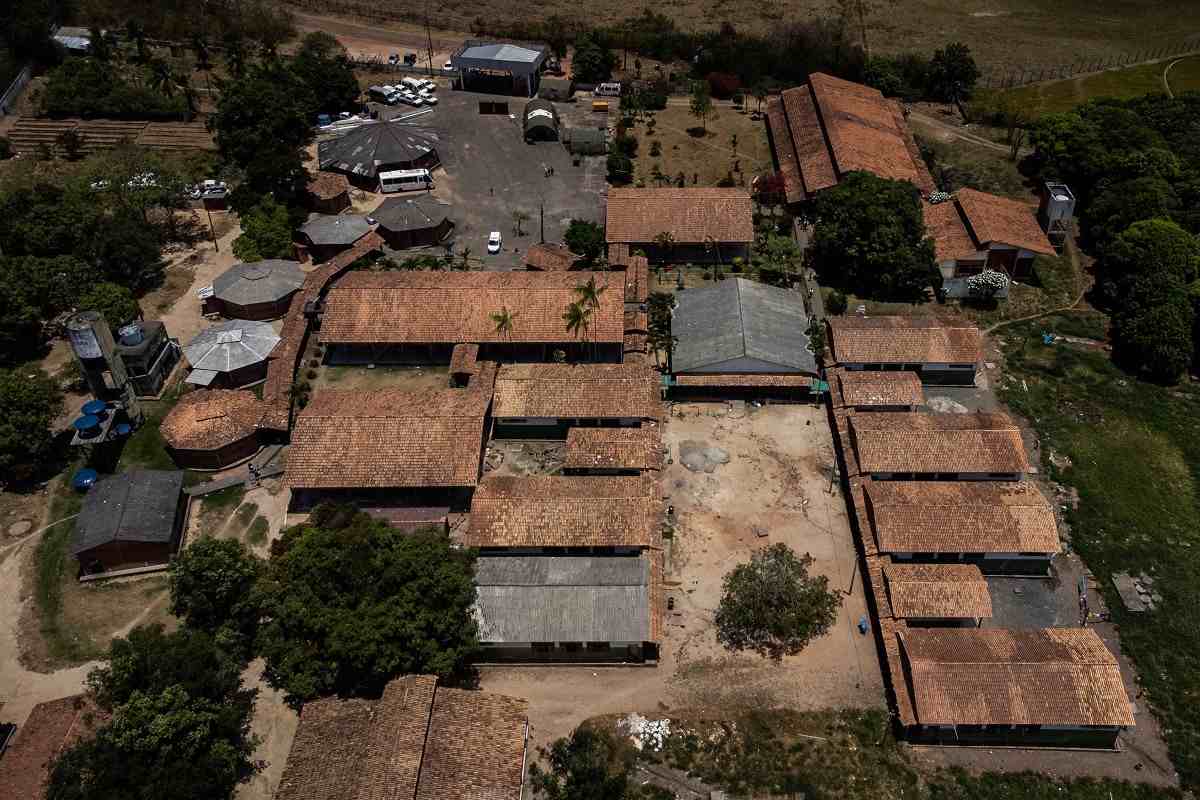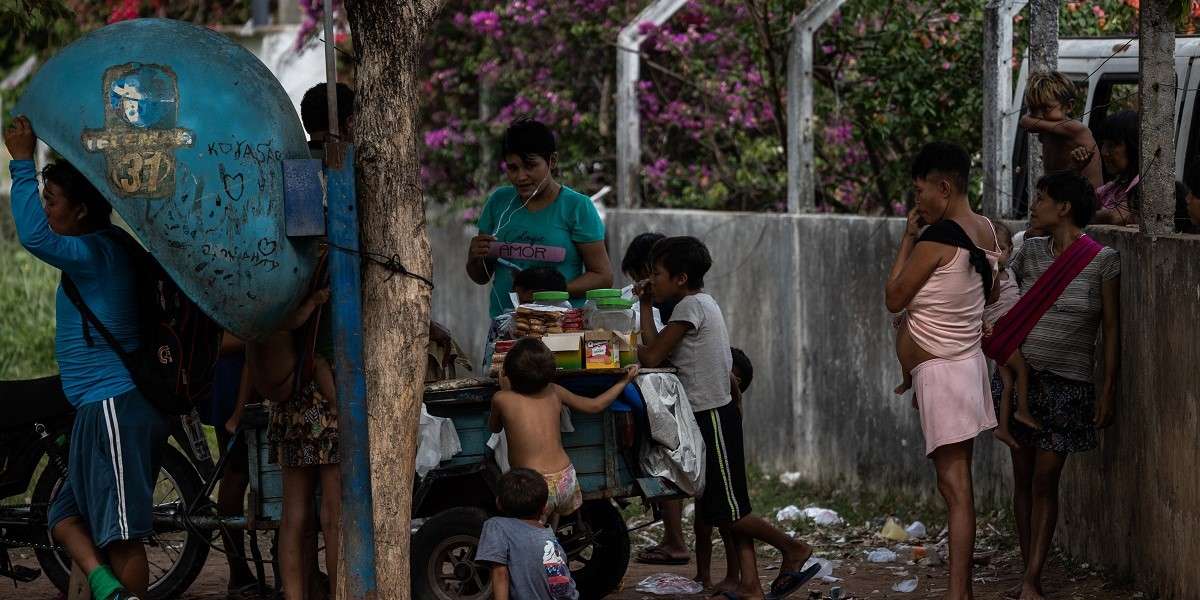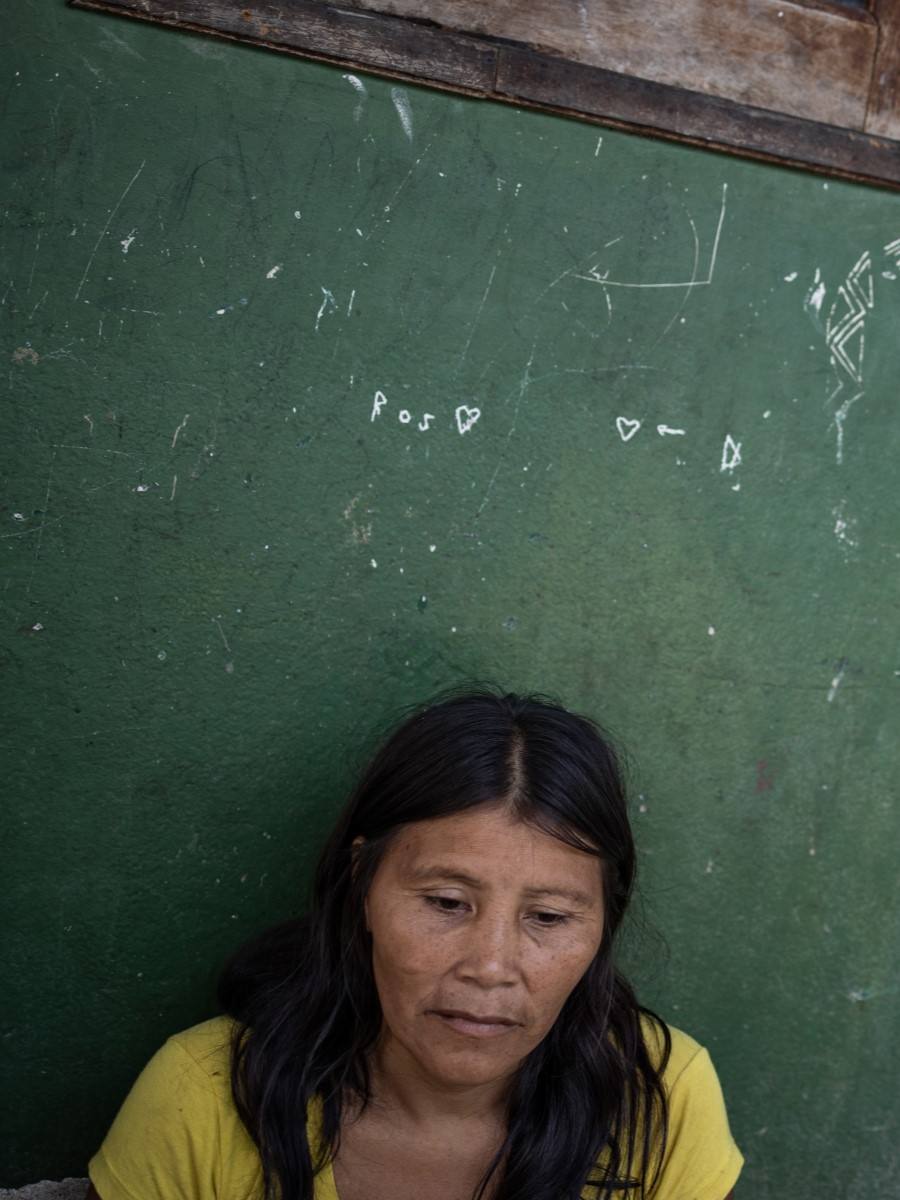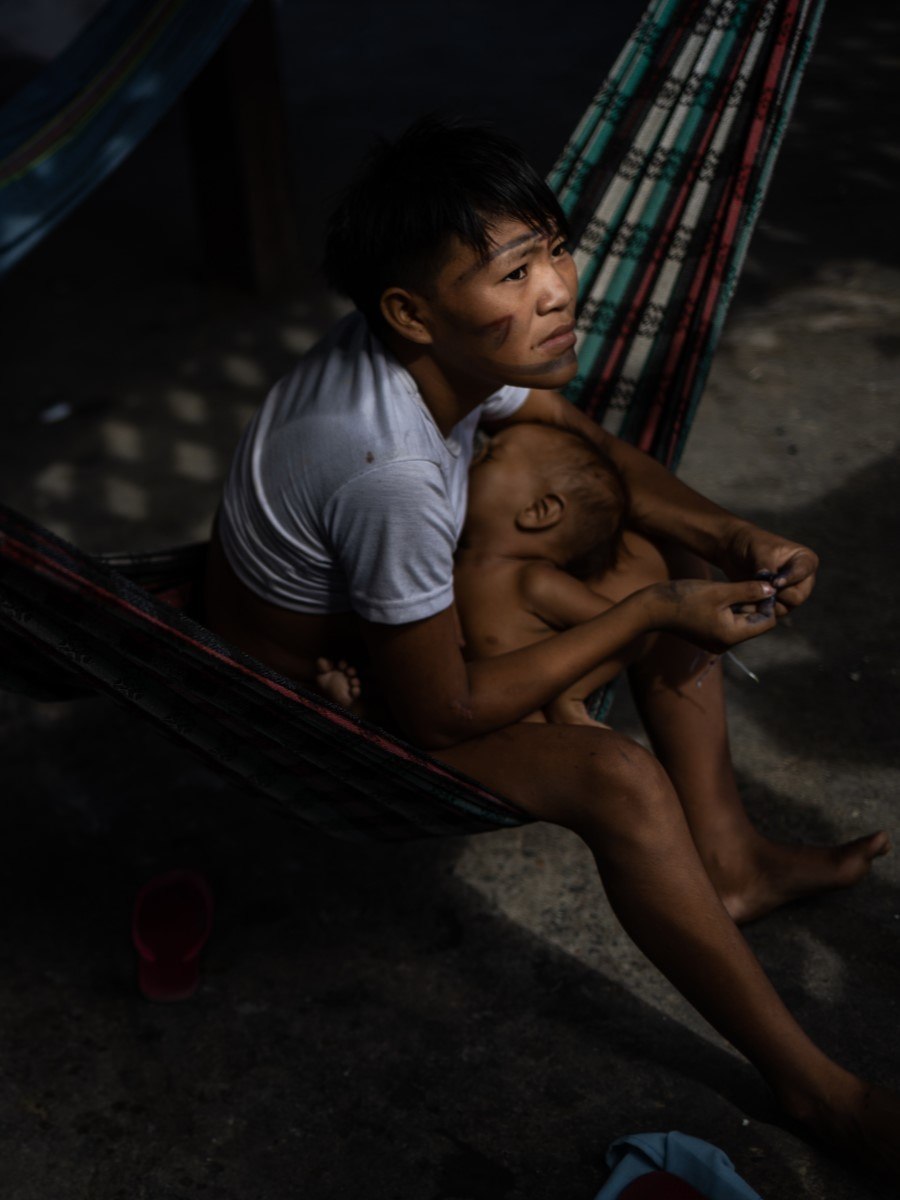
An aerial view of the CASAI complex.
11:31 JST, April 24, 2023
BOA VISTA, Brazil – First came the gold miners, the community said. Then illness and disease spiked.
The wounds the miners gouged into the earth collected water that attracted disease-bearing mosquitoes, community members said, and the rivers on which they rely turned from blue to the color of Coca-Cola.
Supplies of lifesaving drugs ran dry, leaving the sick to die of treatable conditions. Survivors lamented losing loved ones to malaria and tuberculosis and worried their babies would meet the same ends.
The Yanomami, one of the Amazon’s largest Indigenous groups, are suffering a crisis of malaria and malnutrition that their leaders say threatens their very existence.
Mining has poisoned the water they drink and the fish they eat with mercury. It’s thinned the population of animals they hunt. Their home, a once-pristine swath of the Amazon, has been ravaged by illegal deforestation and gold mining aided and abetted by the administration of Jair Bolsonaro.
Gold miners arrived more than four decades ago. But with Bolsonaro’s inauguration in 2019, they had as president an ally, a man who rallied against the creation of Indigenous territories and for the development of the Amazon.
As Bolsonaro crippled Ibama, the environmental agency charged with keeping the miners out, their number ballooned to 20,000. The former president’s critics now say he is guilty not only of indifference, but of a crime: genocide.
“It’s been a nightmare these last four years,” said Júnior Hekurari Yanomami, who leads the health council for Yanomami in the northern state of Roraima. “Bolsonaro encouraged these deaths.”
They are not alone in leveling the charge. President Luiz Inácio Lula da Silva, who defeated Bolsonaro last year in a bitterly fought campaign, met with famine-stricken adults and children in January.
“More than a humanitarian crisis, what I saw in Roraima was genocide,” Lula tweeted. “A premeditated crime against the Yanomami, committed by a government insensitive to the suffering of the Brazilian people.”
Justice Minister Flávio Dino said he saw “strong indications of the crime of genocide” and called on the federal police to investigate the former Bolsonaro administration. Supreme Court Justice Luís Roberto Barroso, who ordered the government last year to expel the gold miners, has also called for an investigation, citing allegations that officials tipped off gold miners before evictions.
The accusation of genocide by government inaction is novel in Brazil. Courts here have convicted five people of genocide; all were gold miners who participated in a massacre of Yanomami in the early 1990s.
Bolsonaro isn’t accused of using weapons against the Yanomami. Critics are focusing instead on what they say he failed to do: respond to Yanomami pleas for food, medicine and help evicting the miners.
Investigators plan to interview the Yanomami and to study Bolsonaro’s public declarations and government correspondence. They hope to interview Bolsonaro.
In a statement to The Washington Post, Bolsonaro said patrolling Brazil’s Yanomami reserve, a Portugal-sized expanse with no access roads and limited landing strips, is difficult. Nonetheless, he said, his administration increased federal spending on protecting the Yanomami and monitoring their territory. He said the “critical state of malnutrition, with deaths,” is “regretted,” but suggested the patients in Boa Vista might have come from Yanomami territory in Venezuela, sent in collusion with Venezuelan President Nicolás Maduro to make him look bad.
He did not respond to questions about whether he planned to cooperate with investigators.
To win a conviction, analysts say, prosecutors will have to show criminal intent – that the failure to respond was part of a broader plan to injure the Yanomami.
“In several instances, Bolsonaro has said that he was not only against recognizing Indigenous rights, but also against the existence of the Indigenous peoples,” said Wallace Corbo, a law professor at the Getulio Vargas Foundation in Rio de Janeiro. “That’s where the foundation of the claim that neglect was intentional lies.”
Gilmar Mendes, a supreme court justice, said there’s evidence that the Bolsonaro administration ignored the Yanomami’s pleas for help.
After Lula’s visit, Mendes said, “documents also began to emerge of complaints that were made by organizations that take care of Indigenous communities.”
“The indication is that there was no response from the government to them,” he said.
In Boa Vista, where people are airlifted to receive medical attention, hundreds gathered at a government-run shelter. Children tugged at the pant legs of doctors and nurses or chased each other. Some were naked, revealing distended bellies and sticks for legs and arms. Young women hoisted tiny babies with sunken eyes. Some adults were bone-thin.
These were the lucky ones. More severe cases were being treated in a hospital.

Yanomami people at the shelter.
In 2022, 99 children in Yanomami territory under age 5 succumbed to “preventable diseases,” researchers commissioned by the Health Ministry reported. Cases of malaria more than doubled from 2018 to more than 20,000 in 2021.

Lenia Yanomami, who believes she’s around 30, has lost children to malaria and tuberculosis.
Lenia Yanomami arrived in Boa Vista in February from Palimiú.
Thin, with weathered skin, she wore a permanent look of worry. She had lost two of her children – one to malaria, one to tuberculosis.
Two surviving children were staying with her at the shelter. Brightly colored hammocks hung from metal frames.
A man had brought his daughter here because she had for months lost her appetite. She was undergoing neurological testing for a condition doctors told him was linked to mercury exposure.
Cecília Yanomami lounged in her hammock, breastfeeding her baby while threading beads for a necklace. She had come when the malnourished girl developed diarrhea. She worried that when they returned home she would again fall ill.
The Yanomami do not name their children until they are older, when they are more confident they will survive.

Cecília Yanomami feeds her baby.
The baby did not yet have a name.
The crisis now in Yanomami territory is only the latest chapter in their decades-long struggle to maintain their land and way of life. Each wave of invaders has brought disruption and disease.
The Yanomami didn’t come into regular contact with the outside world until the 1940s. Four decades later, some 40,000 gold miners flooded their territory, according to the advocacy group Survival International. Disease and violence killed a fifth of the population in seven years.
In the early 1990s, land was set aside for the Yanomami and the miners were expelled. But not everyone supported the move. One congressman in 1998 said the land belonged to all of Brazil and should be developed to increase the country’s wealth.
“It’s a shame that the Brazilian cavalry hasn’t been as efficient as the Americans, who exterminated the Indians,” Jair Bolsonaro told a newspaper at the time.
When he took office at the beginning of 2019, activists say, Bolsonaro swiftly made changes that hampered the government’s ability to support the Yanomami. He appointed officials with little relevant experience to run government agencies in charge of environmental protection and Indigenous affairs. He attempted to dissolve the Indigenous health agency.
Diego Milleo Bueno heads the Roraima state office of Ibama. Under Bolsonaro, he said, the environmental agency halted most operations to evict gold miners from Yanomami territory. He believes that’s why gold mining flourished under Bolsonaro.
Indigenous leaders asked the administration for help but received no response, advocates say. It wasn’t until 2021, when pressed by a court ruling, that authorities resumed enforcement operations.
As disease and famine spread, the Yanomami encountered a system ill-equipped to address their needs. Health clinics in Indigenous territories closed, environmental and human rights groups say, and people began dying of malaria and pneumonia. In one community, two children were pulled into a river by the wake of a mining dredge and drowned. A shaman and two children succumbed to malaria when they could not get treatment.
With more attention now, there are signs that conditions for the Yanomami are improving. The environmental agency has launched efforts to destroy mining operations. Some rivers have begun to turn back to blue.
Back at the shelter, Lenia’s grandniece played gleefully at her feet. Lenia picked the girl up and pointed out a brown mark on her neck, where doctors had injected her with medicine for malaria. She now bore the chunky legs, arms and belly of a healthy infant.
Her name is Thalissia.
Top Articles in News Services
-

Survey Shows False Election Info Perceived as True
-

Hong Kong Ex-Publisher Jimmy Lai’s Sentence Raises International Outcry as China Defends It
-

Japan’s Nikkei Stock Average Touches 58,000 as Yen, Jgbs Rally on Election Fallout (UPDATE 1)
-

Japan’s Nikkei Stock Average Falls as US-Iran Tensions Unsettle Investors (UPDATE 1)
-

Trump Names Former Federal Reserve Governor Warsh as the Next Fed Chair, Replacing Powell
JN ACCESS RANKING
-

Producer Behind Pop Group XG Arrested for Cocaine Possession
-

Japan PM Takaichi’s Cabinet Resigns en Masse
-

Japan Institute to Use Domestic Commercial Optical Lattice Clock to Set Japan Standard Time
-

Man Infected with Measles Reportedly Dined at Restaurant in Tokyo Station
-

Israeli Ambassador to Japan Speaks about Japan’s Role in the Reconstruction of Gaza






















